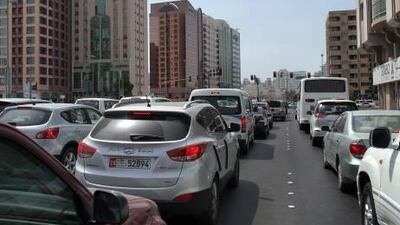DUBAI // Motorists across the Emirates are complaining of increased morning traffic congestion since the start of Ramadan, but police say the only solution is cautious driving.
The main areas of reported problems are the roads leading into the capital, and from Sharjah to Dubai.
Some drivers heading to Abu Dhabi from Dubai were surprised to find the roads so congested at about 9am.
Aseel Khatib, a Palestinian marketing coordinator who commutes frequently from her home at the Dubai Marina to her office near Airport Road, said her trip was 30 minutes longer.
"It normally takes me only an hour to get to work," Ms Khatib said. "But lately it's been taking me a good hour and a half. Most of the congestion is right before I enter the city."
Ms Khatib said there did not seem to be any cause for the traffic jams.
"As I'm slowly driving I'd wait to see an accident or some kind of wreck," she said. "But suddenly the road is free-flowing with no accident to be seen."
Lt Col Jamal Al Ameri, the head of public relations at the Abu Dhabi Traffic and Patrols Directorate, said a shift in the rush hour was expected during Ramadan.
"Before, people would go to work at 7.30 or 8am . now everyone goes at 9," Lt Col Al Ameri said. "So it's not unusual. It's just that the work timings have changed."
He said lack of sleep in the holy month exacerbated the situation as it led to reduced concentration.
"People should make sure they get enough sleep so that they can avoid dangerous mistakes in the morning and focus on the road," Lt Col Al Ameri said.
There had been no major accidents or fatalities in Abu Dhabi since the start of Ramadan, he said, adding slow traffic on Salam Street was caused by road works.
Ali Berri, a Lebanese brand manager living in Sharjah, said it took him more than an hour to reach his office in the Dubai Airport Free Zone, compared with 20 minutes last week.
"On the first day of Ramadan, I left at 8.45am and reached [work] at 10am," Mr Berri said. "Now I leave at 10.30am and I reach within 10 minutes. Everyone is already hungry, tired and frustrated. It's like they're all waiting for just one reason to pick a fight."
Rusol Tamimi, an account executive who commutes from her home at the American University of Sharjah to her office in Deira City Centre, said her travel time had increased by about 20 minutes.
"It's particularly heavy around the National Paints roundabout at Emirates Road," Ms Tamimi said. "Once I'm in Dubai, though, the roads are fine."
Col Abdul Rahman Khattar, the director of media and traffic awareness at Sharjah Police, said officers were intensifying patrols on all roads.
In Ajman, police are increasing patrols near mosques during taraweeh prayers and at markets during the evening, said Lt Col Shuaib Abdullah Kajol, the director of the Traffic and Patrol Department.
Lt Col Kajol said most accidents occurred before iftar and the worst congestion was at night during isha prayers.
Officials said the afternoon rush hour had generally shifted from 6pm to 3pm but motorists who left closer to iftar also risked being exposed to unsafe driving.
Lt Col Al Ameri said drivers who ran red lights to make it in time for iftar were a particular problem. "They are endangering their own lives and the lives of other motorists," he said. "These drivers will be subject to eight black points on their record."
According to the traffic law, offenders also will have to pay a fine of Dh800 and their vehicles will be confiscated for 15 days.
Dubai Police this week called on drivers to be more cautious during Ramadan rush hours.
Lt Col Saif Al Mazroui said most accidents in Dubai during Ramadan happened between 1pm and 5pm.
mismail@thenational.ae
* With additional reporting by Awad Mustafa and Yasin Kakande

Police warn drivers over Ramadan rush
Officials say the hectic morning traffic since the start of Ramadan is "normal" and urge drivers to be careful.
Most popular today
